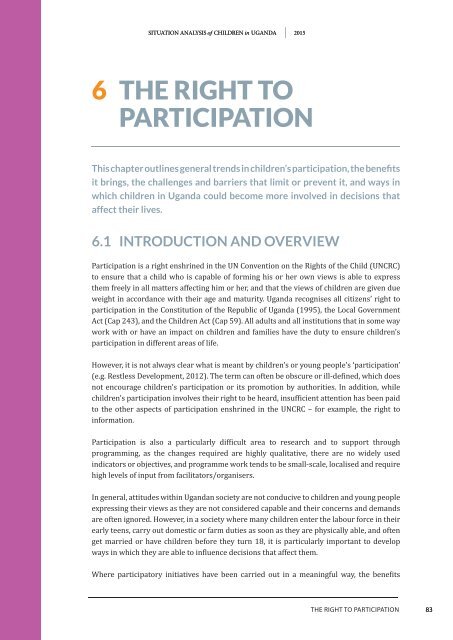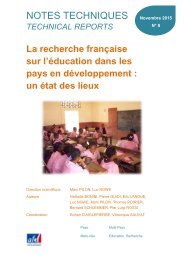Situation analySiS
1TNu802
1TNu802
Create successful ePaper yourself
Turn your PDF publications into a flip-book with our unique Google optimized e-Paper software.
<strong>Situation</strong> <strong>analySiS</strong> of Children in uganda 20156 the right topArticipAtionThis chapter outlines general trends in children’s participation, the benefitsit brings, the challenges and barriers that limit or prevent it, and ways inwhich children in Uganda could become more involved in decisions thataffect their lives.6.1 INTRODUCTION AND OVERVIEWParticipation is a right enshrined in the UN Convention on the Rights of the Child (UNCRC)to ensure that a child who is capable of forming his or her own views is able to expressthem freely in all matters affecting him or her, and that the views of children are given dueweight in accordance with their age and maturity. Uganda recognises all citizens’ right toparticipation in the Constitution of the Republic of Uganda (1995), the Local GovernmentAct (Cap 243), and the Children Act (Cap 59). All adults and all institutions that in some waywork with or have an impact on children and families have the duty to ensure children’sparticipation in different areas of life.However, it is not always clear what is meant by children’s or young people’s ‘participation’(e.g. Restless Development, 2012). The term can often be obscure or ill-defined, which doesnot encourage children’s participation or its promotion by authorities. In addition, whilechildren’s participation involves their right to be heard, insufficient attention has been paidto the other aspects of participation enshrined in the UNCRC – for example, the right toinformation.Participation is also a particularly difficult area to research and to support throughprogramming, as the changes required are highly qualitative, there are no widely usedindicators or objectives, and programme work tends to be small-scale, localised and requirehigh levels of input from facilitators/organisers.In general, attitudes within Ugandan society are not conducive to children and young peopleexpressing their views as they are not considered capable and their concerns and demandsare often ignored. However, in a society where many children enter the labour force in theirearly teens, carry out domestic or farm duties as soon as they are physically able, and oftenget married or have children before they turn 18, it is particularly important to developways in which they are able to influence decisions that affect them.Where participatory initiatives have been carried out in a meaningful way, the benefitsthE rIGht to PartICIPatIoN83




